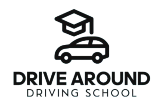Frequently Asked Questions
- Apply for a Provisional Driving Licence. You must be at least 17 years old (or 16 if you receive the enhanced rate of the mobility component of PIP).
- Know the Highway Code & Theory Test. You don’t need to pass your theory test before taking lessons, but studying the Highway Code, road signs, and hazard perception early will help.
- Eye Check - Legal Requirement – You must be able to read a number plate from 20 metres (about 5 car lengths) to legally drive.
- Step 1: Check You’re Eligible
- ✔ You must pass your theory test before booking the practical test.
- ✔ Have a valid provisional driving licence.
- ✔ Ensure you’re ready and confident in your driving skills.
Step 2: Visit the Official Website Go to 'GOV.UK - Book a Driving Test' to book your test online.
Step 3: Provide Your Details You'll need:
- 🔹 Your provisional driving licence number
- 🔹 Your theory test pass certificate number
- 🔹 A credit or debit card to pay the fee (£62 for a weekday test, £75 for evenings/weekends)
Step 4: Choose Your Test Centre & Date
- 🔹 Select a nearby driving test centre (e.g., Nottingham, Colwick, Chilwell, etc.).
- 🔹 Pick an available date and time that suits you.
Step 5: Confirmation & Preparation
- ✔ You’ll receive a confirmation email with your test details.
- ✔ Make sure your instructor’s car (or your own, if using it) is insured and meets test requirements.
- ✔ Keep practicing to increase your chances of passing on the first attempt!
💡 Tip: Driving test slots can be booked up quickly, so check regularly for cancellations if you need an earlier date!
However, everyone learns at their own speed. Some may need fewer lessons, while others may benefit from more structured practice. The key is to focus on building safe, confident driving skills, rather than just passing the test.
During your first few lessons, I'll assess your progress and give you a realistic estimate of how many lessons you might need. My goal is to get you driving safely and confidently as efficiently as possible.
✔ More Driving Flexibility – A manual licence allows you to drive both manual and automatic cars, while an automatic licence limits you to automatics only.
✔ Better Car Control – Learning to use gears gives you more control over the car, especially in challenging conditions like icy roads or steep hills.
✔ More Job & Car Choices – Many jobs require a manual licence, and manual cars are often cheaper to buy and rent compared to automatics.
✔ Smoother Transition – If you learn in a manual, you can drive any car in the future. If you learn in an automatic and later want to drive a manual, you’ll need to retrain and take another test.
If you’re unsure, I’d recommend starting with a manual—you can always switch to automatic later if needed, but learning manual first gives you more options and confidence on the road!
✔ Builds Confidence – The more you drive, the more comfortable and in control you’ll feel behind the wheel.
✔ Develops Muscle Memory – Skills like steering, clutch control, and gear changes become second nature with regular practice.
✔ Prepares You for Real-Life Situations – Experience different road types, weather conditions, and traffic scenarios so you're ready for anything.
✔ Increases Your Chances of Passing – Learners who practice consistently are more likely to pass their test the first time.
✔ Creates Safer Drivers – Good driving habits develop over time, making you a more skilled and responsible driver for life.
The key is to practice regularly with an instructor and, if possible, with a supervising driver outside of lessons to speed up your learning!
